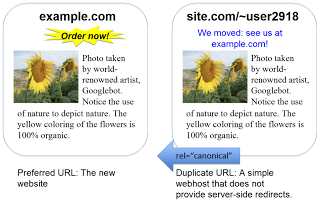Tuesday, December 15, 2009
We've recently discussed several ways of
handling duplicate content on a single website;
today we'll look at ways of handling similar duplication across different websites, across
different domains. For some sites, there are legitimate reasons to duplicate content across
different websites—for instance, to migrate to a new domain name using a web server that
cannot create server-side redirects. To help with issues that arise on such sites, we're
announcing our support of the
cross-domain rel="canonical" link element.

Ways of handling cross-domain content duplication:
-
Choose your preferred domain
When confronted with duplicate content, search engines will generally take one version and filter the others out. This can also happen when multiple domain names are involved, so while search engines are generally pretty good at choosing something reasonable, many webmasters prefer to make that decision themselves. -
Reduce in-site duplication
Before starting on cross-site duplicate content questions, make sure to handle duplication within your site first. -
Enable crawling and use
301(permanent) redirects where possible Where possible, the most important step is often to use appropriate301redirects. These redirects send visitors and search engine crawlers to your preferred domain and make it very clear which URL should be indexed. This is generally the preferred method as it gives clear guidance to everyone who accesses the content. Keep in mind that in order for search engine crawlers to discover these redirects, none of the URLs in the redirect chain can be disallowed via a robots.txt file. Don't forget to handle your www / non-www preference with appropriate redirects and in Webmaster Tools. -
Use the cross-domain
rel="canonical"link element
There are situations where it's not easily possible to set up redirects. This could be the case when you need to move your website from a server that does not feature server-side redirects. In a situation like this, you can use therel="canonical"link element across domains to specify the exact URL of whichever domain is preferred for indexing. While therel="canonical"link element is seen as a hint and not an absolute command, we do try to follow it where possible.
Still have questions?
Do the pages have to be identical?
No, but they should be similar. Slight differences are fine.
For technical reasons I can't include a 1:1 mapping for the URLs on my sites. Can I just
point the rel="canonical" at the home page of my preferred site?
No; this could result in problems. A mapping from old URL to new URL for each URL on the old site
is the best way to use rel="canonical".
I'm offering my content / product descriptions for syndication. Do my publishers need to use
rel="canonical"?
We leave this up to you and your publishers. If the content is similar enough, it might make
sense to use rel="canonical", if both parties agree.
My server can't do a 301 (permanent) redirect. Can I use
rel="canonical" to move my site?
If it's at all possible, you should work with your webhost or web server to do a
301 redirect. Keep in mind that we treat rel="canonical" as a hint,
and other search engines may handle it differently. But if a 301 redirect is
impossible for some reason, then a rel="canonical" may work for you. For more
information, see our
guidelines on moving your site.
Should I use a noindex robots
meta tag
on pages with a rel="canonical" link element?
No, since those pages would not be equivalent with regards to indexing—one would be allowed
while the other would be blocked. Additionally, it's important that these pages are not
disallowed from crawling through a robots.txt file, otherwise search engine crawlers will not
be able to discover the rel="canonical" link element.
We hope this makes it easier for you to handle duplicate content in a user-friendly way. Are there still places where you feel that duplicate content is causing your sites problems? Let us know in the Webmaster Help Forum!
